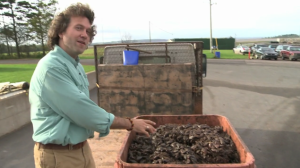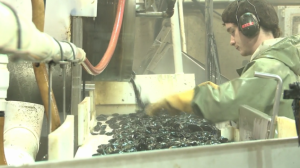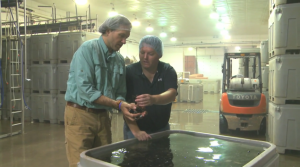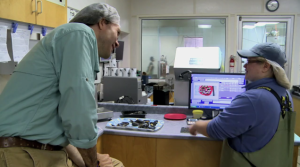Mussel Processing
 The cold clear waters around Prince Edward Island are some of the most pristine on the planet. Their nutrient-rich purity supports a variety of thriving fisheries including mussels — both wild and farmed. Since wild mussels are found attached to every wharf and many exposed rocks above the tidal line mussel farming is really about encouraging mussels to do what already comes naturally.
The cold clear waters around Prince Edward Island are some of the most pristine on the planet. Their nutrient-rich purity supports a variety of thriving fisheries including mussels — both wild and farmed. Since wild mussels are found attached to every wharf and many exposed rocks above the tidal line mussel farming is really about encouraging mussels to do what already comes naturally.
It takes almost two years to cultivate delicious farmed fresh blue mussels. The spawning season runs from May to July, varying slightly between provinces. Males release billions of sperm into the water triggering females to release millions of eggs. The fertilized eggs quickly develop into free-swimming larvae, floating in the water for 21 to 30 days depending on where they are grown.
During this time, mussel growers prepare special collectors made of frayed rope suspended in the water by buoys. The larvae swimming in the water column easily attach themselves to these surfaces.
By September, the mussels have grown enough to be collected, taken ashore, sorted and transferred into a tubular mesh material called a sock, which can be anywhere from six to 20 feet long (2 to 6 metres).
The socks are returned to the ‘farm’ then left suspended in the water for anywhere from 18-30 months depending on the site and the province. During this time, the mussels move to attach themselves to the outside surface of the mesh.
By creating these ideal conditions for their mussels our farmers are able to avoid the pitfalls of wild mussels. The mussels are not exposed to predators on the ocean floor and by being suspended in the water column live in a virtual buffet of nutrients that encourages their rapid tasty growth.
At harvest time specialized boats hoist the heavy socks aboard and remove the mussels. The shellfish are transferred ashore once again where this time they are cleaned, sorted and bagged for market.
 One of the most important steps in this on-shore process is the gentle removal of the mussels tough bissel threads, the threads they use to attach themselves to surfaces in nature. These threads are extremely tough and not very palatable so removing them benefits cooks. The machinery is able to take them off without harming the mussel.
One of the most important steps in this on-shore process is the gentle removal of the mussels tough bissel threads, the threads they use to attach themselves to surfaces in nature. These threads are extremely tough and not very palatable so removing them benefits cooks. The machinery is able to take them off without harming the mussel.
Every week millions of pounds of fresh mussels are shipped all over North America to local fishmongers. Mussels are excellent travelers and arrive at their destination fresh and ready for your kitchen!
